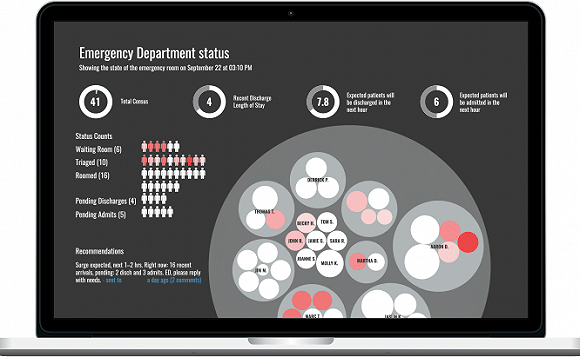According to CB Insights, in 2012, there were no more than 20 artificial intelligence companies focused on medical care worldwide; last year there were nearly 70 worldwide. Clearly, artificial intelligence technology is making great strides in the medical industry . More than that, according to market research firm MarketsandMarkets, the medical sector will be one of the biggest drivers of artificial intelligence development in the next six years. From 2016 to 2022, the AI ​​overall market will grow at a compound annual growth rate of 62.9% and is expected to become a $16.2 billion market. Here, six senior executives of well-known medical information companies have expressed their views on the future of medical artificial intelligence in the next 20 years. 1. Mudit Garg, co-founder and CEO of Qventus, which uses artificial intelligence to optimize the entire hospital operating system: Qventus optimizes hospital processes with artificial intelligence “Many people nowadays like to imagine the fact that AI completely replaces doctors. But in fact, the problem of medical system is not the inefficiency of medical service providers, but how to create an efficient working environment for excellent doctors. Optimized with artificial intelligence. The concept of a work environment is boring and not sexy compared to the concept of a “robot surgeonâ€, but it is also the biggest opportunity for us to improve the patient experience and reduce medical costs. There is no need to wait for 20 years to see the impact of artificial intelligence, because many hospitals now benefit from it. Artificial intelligence to do business arrangements can improve patient flow efficiency, reduce surgical delays and cancellations, and eliminate patient falls. Last year, a hospital reduced the waiting time for patients by a million minutes through an artificial intelligence optimization system. The more widely used AI, the lighter the burden on hospitals and doctors, and the lower the burnout rate of medical staff. The flexible arrangement of AI allows them to focus on what needs attention, rather than distracting each bit of data, every possible role and reaction. †2. Charles Koontz, CEO and Chairman of General Healthcare Information and Chief Digital Officer of General Medical: “The shift in medical digitalization is under way. Machine learning and artificial intelligence have demonstrated the potential to improve medical efficiency and quality, and will continue to show their importance over the next 20 years. For example, General Medical and the University of San Francisco have begun to collaborate on digital healthcare. The project builds a deep learning algorithm library to help doctors analyze scan images and diagnose patients more quickly and accurately. One of the algorithms can identify the pneumothorax display in medical images. Once the symptoms are identified, the radiology department can be alerted. The doctor opens a quick passage for the patient to get a quick treatment for the patient to improve the curative effect and reduce the patient's pain. Over time, insights derived from these algorithms can lead to the development of next-generation algorithms that will solve more complex problems with fewer images. As artificial intelligence is trained to become more agile, traditional forms of diagnosis and treatment may result in subversive changes. †Personal Care,Hair Conditioner,Body Wash Shower Gel,Moisturizing Shower Gel Wuxi Keni Daily Cosmetics Co.,Ltd , https://www.kenidailycosmetics.com